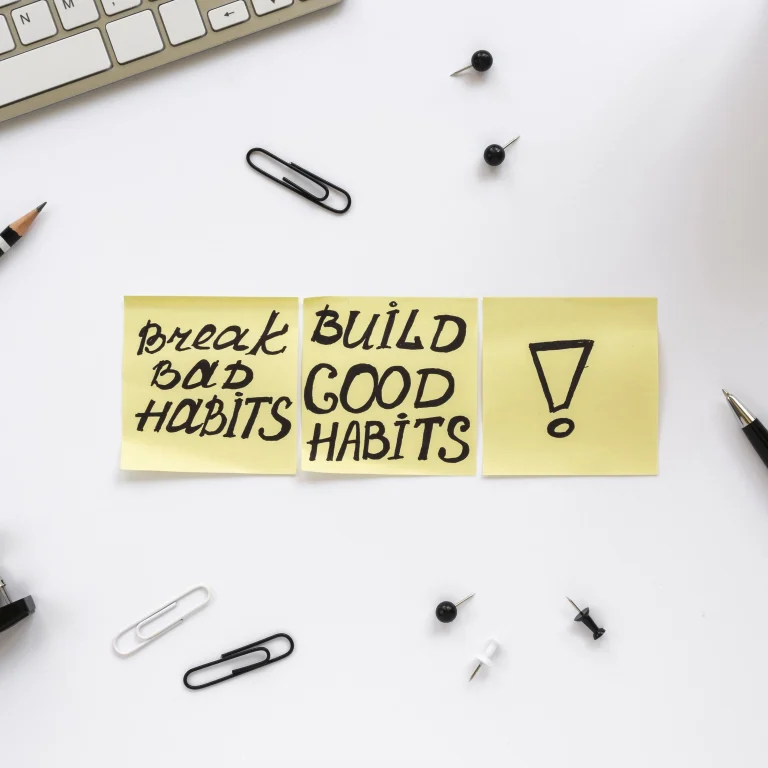Do you ever find yourself starting a new project with tons of excitement, only to lose steam halfway through?
Have you ever, a little agitated, stood in front of the mirror and asked yourself, how do I stop leaving things unfinished?
I know I have. There is a guitar sitting in the corner of my house. I am sure, she is wishing for a new owner right now. Also we are not alone, almost 92% of people don’t achieve the goals they set.
It’s so easy to get caught up in the rush of starting something new, something shiny, only to see it gather dust later. It could be anything, a work assignment, a hobby, or even just cleaning the house, leaving things unfinished can be pretty irritating. And for some of us, it can be discouraging when it comes to trying new things.
But guess what? You can change that! If you really want it, and are willing to get to the end of the blog, you will have some interesting things to try. I promise.
What’s in the Blog?
In this blog, I will try to find why we have these weird little habit and share some simple, practical tips to help you stop leaving things unfinished. From understanding the impact of unfinished tasks to learning how to set clear goals and minimize distractions, I will cover it all.
Are you ready to start finishing what you take on? Let this blog be the first thing you finish, and if you are eager to experiment with our actionable tips, feel free to scroll to the end. I wouldn’t mind.
Why Do We Leave Things Unfinished?
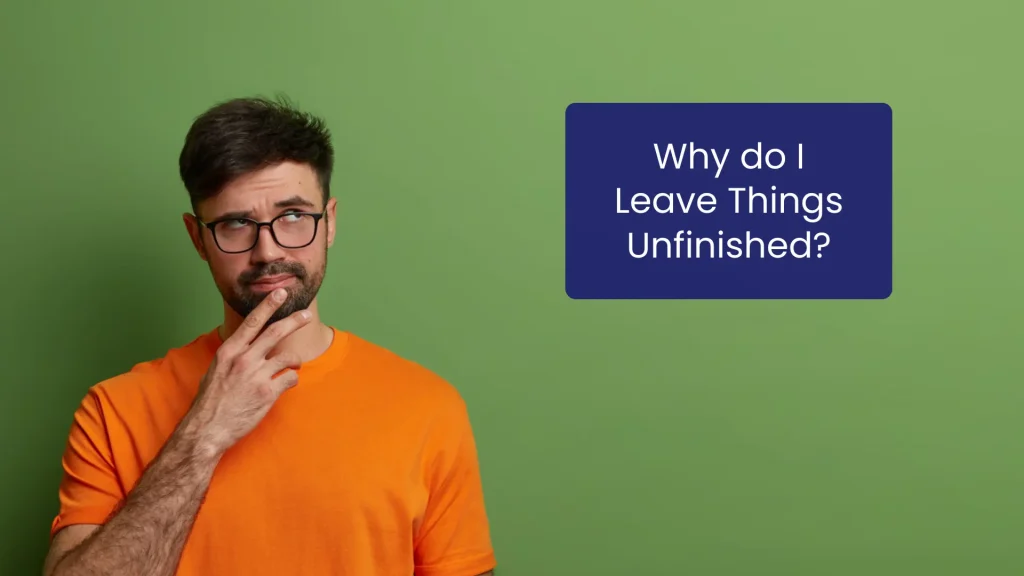
Yes, with your love for learning, you start a lot of things, and if you are here, then you (probably) also leave a lot of things unfinished. One might argue that it is easy to start a lot of things but hard to finish them because the mountain gets steeper as you climb, right?
I don’t know about the mountains, but I can try to explain why, you, your friends, and I leave things in the middle. How does a simple point breakdown sound to you?
There are two main reasons we leave one thing and look for something else:
Psychological Factors
These are the internal factors that you, as a human, have collected in your subconscious and the factors that have become your not-so-good friends. You know the friends who say, “Why are you studying? We still have three days before the exams.”
Some of these are:
a. Fear of Failure
- Sometimes, you are scared you won’t do a good job, so you stop trying. It’s like if we never finish, you never have to face the possibility that we didn’t succeed.
- Example: You start writing a story but worry it won’t be good enough, so you never finish it.
b. Lack of Motivation
- Your initial excitement fades, and you lose interest. Without motivation, finishing a task feels like a chore.
- Example: You decide to learn to play guitar, but after a few weeks, practicing feels boring, and you give up.
Environmental Factors
Ever heard the story of a turtle and a rabbit? The one with a race where the turtle wins because the rabbit gets distracted by a carrot? Yes, that one. If not, then you can watch the story here.
So the carrot in the story is an environmental factor that stopped the rabbit from finishing the race.
Let’s see what our carrots are:
a. Distractions
- Our world is full of distractions, from social media to noisy environments. It’s hard to stay focused on one thing for too long.
- Example: You’re working on a project, but keep checking your phone, and before you know it, hours have passed.
b. Poor Time Management
- Not managing our time well makes it hard to see tasks through. You either overestimate how much time you have or underestimate how long something will take.
- Example: You plan to clean the entire house in one afternoon, but it’s too much to handle, and you leave it half-done.
By understanding why you leave things unfinished, you can start making changes to tackle these issues head-on.
Now you know why. You know what. The blog is at a point where we dig deeper for the how. The great news is we don’t just have one how or two hows, we have eleven of those, so you will have options to try. Now you will never leave things unfinished, friend.
Note: Open a new note on the side so you can use this blog as your work-sheet. It could be fun, you know.
11 Effective Ways to Stop Leaving Things Unfinished
1. Understand the Impact
To stop leaving things unfinished, the first step is seeing the big picture and understanding the impact of this habit.
When you see what it is going to build up to, it’s easier to understand why finishing tasks is so important.
Recognize the Consequences and Side Effects
Leaving tasks unfinished can lead to a buildup of stress and anxiety. It’s like having a long to-do list hanging over your head all the time.
Incomplete tasks can clutter your mind and space, and we don’t want that, do we? Because things often get lost in there. Like smoke.
- Productivity Hit: When we don’t finish tasks, our productivity takes a downturn. Starting new projects is exciting, but if we never finish anything, we end up with a bunch of loose ends.
- Mental Strain: Unfinished tasks can cause stress and anxiety. That nagging feeling of having something incomplete can weigh on your mind, leading to burnout over time.
- Studies show that unfinished tasks can significantly increase stress levels, affecting both our mental and physical health. Incomplete tasks are a big reason for workplace stress, cutting overall productivity by up to 30%.
Example:
Starting but not finishing household chores can create a messy and disorganized living space, which can be stressful and overwhelming.
Action Item for You
Let’s start with thinking about a recent task you left unfinished. How did it affect your productivity and mental well-being?
Write down these effects to understand them better.
2. Identify Your Patterns
If you stop and think about your day, it’s really made up of habits. Sometimes we are aware of those, and sometimes we aren’t. Some of those sneaky habits are also the patterns that keep you from finishing things.
Identifying those will help you recognize the common triggers and obstacles that lead to incomplete tasks.
Reflect on Your Habits
Take a step back and think about why you tend to leave things unfinished. Is it because you get bored? Are you easily distracted? Understanding your habits is the first step to changing them.
- Triggers: What usually distracts you? Maybe it’s social media, or when tasks seem too big and overwhelming.
- Obstacles: Learn to recognize the hurdles that prevent you from completing tasks. This could be anything from lack of time to feeling unmotivated.
Example
You might notice that you often leave work projects unfinished because you feel overwhelmed by their size. Recognizing this pattern can help you break the project into smaller, manageable tasks.
Action Item for You
Think about a few tasks you’ve left unfinished recently. What were the common reasons? Write down these patterns and triggers so you can start addressing them.
3. Set Clear Goals
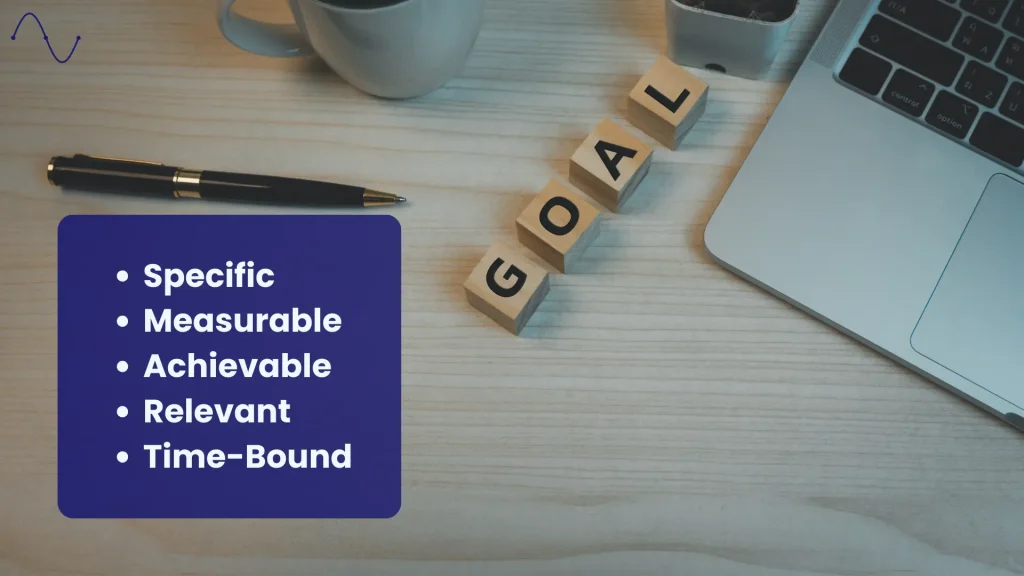
One of the best ways to stop leaving things unfinished is to set clear goals. When you know exactly what you need to do and have a plan in place, it’s much easier to stay on track and see things through to the end.
Define Specific and Achievable Objectives
- Break down your goals into specific, manageable tasks. Instead of a vague goal like “get fit,” try something specific like “exercise for 30 minutes a day.”
- Achievable Steps: Make sure your goals are realistic and attainable. Setting yourself up for success with smaller steps can keep you motivated.
Break Down Larger Projects
- Large tasks can be overwhelming, which often leads to leaving them unfinished. Breaking them into smaller, more manageable parts can make them less daunting.
- Milestones: Set milestones for larger projects. Celebrate small victories along the way to stay motivated.
Oh I almost forgot. We created this amazing goal-setting cheat sheet so you can focus on your goals without the additional chaos. And the best thing? it’s free to download.
Example
Instead of trying to write an entire report in one go, break it down into sections: research, outline, draft, and final edit. This way, you can tackle one part at a time without feeling overwhelmed.
Action Item for You
Think about a large task you need to complete. Break it down into smaller, specific steps, and set a timeline for each step. Write down these steps and check them off as you go.
4. Prioritize Tasks
Knowing how to prioritize your tasks is like being the captain of your own ship. You steer towards the most important destinations first, avoiding the stormy seas of overwhelm and unfinished business.
The Priority Row and One Task at a Time Attack
You have to start by picking out the VIPs of your to-do list—the tasks that demand immediate attention. These are your A-listers, your headliners.
Juggling too many tasks at once is a recipe for disaster, I swear.
- Urgent vs. Important: Use the Eisenhower Matrix to sort your tasks into categories. Focus on what’s important to your long-term success, not just what’s screaming for your attention right now.
- Single-tasking: Instead of multitasking, practice single-tasking. Give your full attention to one task until it’s completed before moving on to the next.
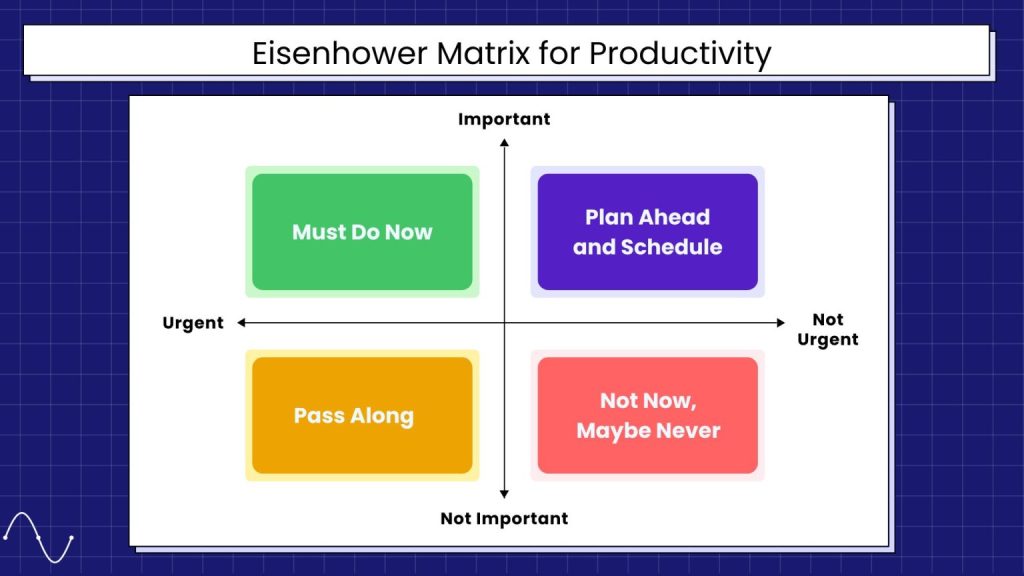
Example
You have a list of tasks, including a major project deadline, a few routine emails, and a minor administrative task. Prioritize the major project first, as it’s the most important, and tackle the routine emails and administrative tasks afterward.
Action Item for You
Make a list of your current tasks. Identify which ones are high-priority.
Focus on completing these tasks one at a time, and don’t move on to the next until the current one is finished.
5. Create a Plan of Action
Just like a master strategist plotting their next move, creating a plan of action sets the stage for success. By breaking down your tasks into actionable steps and setting realistic deadlines, you pave the way for smooth sailing towards completion.
Detailed Plan With Realistic Deadlines
What’s common in every pirate movie? They need a map to reach the treasure. Similarly, you create your map with the steps needed to complete each task, i.e., reach your treasure.
- Break it down: Most of our actions depend on how afraid we are, and big goals make us feel exactly that. That is why you need smaller, manageable chunks that push you toward the big goal.
- Set flexible deadlines: While deadlines are important, allow yourself some wiggle room for unexpected challenges or delays. Adaptability is key to navigating rough waters.
Example
Imagine you have a presentation to prepare. Your plan of action might include smaller steps like researching the topic, creating an outline, gathering materials, designing slides, practicing, and finalizing the presentation.
Action Item for You
Take a moment to outline the steps needed to complete one of your current tasks. Set realistic deadlines for each step, and commit to sticking to them.
“You can’t reach the top without climbing a few smart steps” – Athena and Ares team
6. Get an Accountability Buddy

Having an accountability buddy can be a game-changer when it comes to finishing tasks. It’s like having a workout partner but for all your goals!
Where to Look for an Accountability Partner?
- Connect with friends, family, or colleagues who can check your progress and give you that extra nudge whenever needed.
- Support System: These buddies are there to cheer you on and keep you motivated, making the journey less lonely and more fun.
Hire an Accountability Buddy
- If you need more structured support, consider hiring a professional accountability buddy. They can provide regular check-ins and help you stay on track.
- Expert Guidance: A professional can offer tips and strategies tailored to your needs, helping you overcome specific challenges.
Example
Imagine you have a goal to write a book. You get an accountability buddy who checks in with you every other day, you share progress, and you get encouragement. Sounds good, right?
Tired of Leaving Things in the Middle?
Get an Accountability Partner to Increase Your Chances of Reaching the Finish Line by 95%
Action Item for You
Think of someone who could be your accountability buddy. Reach out to them and explain your goals. If you are serious about what you want to achieve and prefer a more structured approach, hire a professional partner.
7. Minimize Distractions
The world is full of distractions, and staying focused can feel like trying to herd cats. To finish your tasks, you need to create an environment where distractions are kept at bay.
Identify and Eliminate Distractions
Talking from experience, awareness could be a gift to increase productivity in life. Pinpoint what usually steals your focus away. Is your phone, social media, or that comfy couch calling your name?
- Remove temptations: Put your phone on silent, close unnecessary tabs, and if needed, lock yourself in a room away from the TV and fridge.
- Create a conducive work environment: Set up a dedicated and comfortable (but not too cozy; you don’t want to nap there, haha) workspace that encourages productivity. Think of it as your command center, where only important missions (tasks) get executed.
Example
You’re trying to finish a report, but every five minutes, you’re checking your phone. Solution? Put your phone in another room or use apps that limit your screen time. Suddenly, you’re the productivity superhero you always knew you could be.
Action Item for You
Identify the top three distractions that usually sidetrack you. Develop a plan to eliminate or reduce these distractions while working. Set up your workspace to be a distraction-free zone, and watch your productivity soar!
8. Practice Time Management
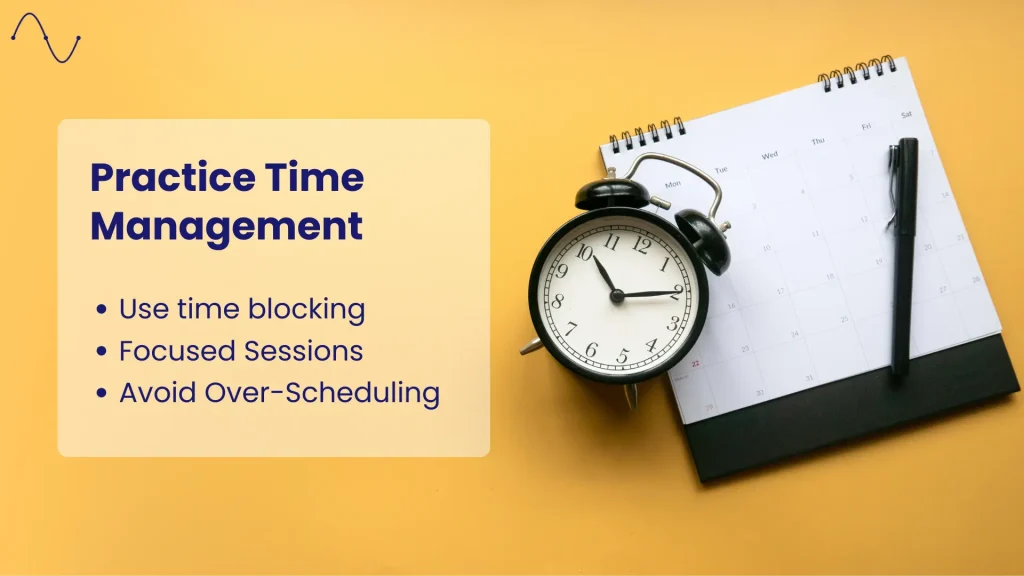
Are you a superhero? No? Well, you could be. Good time management is like having a secret superpower. It helps you stay focused and ensures you have enough time to finish everything you start.
Allocate Dedicated Time Slots
Set aside specific times for each task. It’s like making an appointment with yourself to get things done.
- Time Blocking: Divide your day into blocks of time, each dedicated to a specific task or group of tasks.
- Pomodoro Technique: Work for 25 minutes, then take a 5-minute break. Repeat this cycle to keep your mind fresh and your productivity high.
- Avoid Over-Scheduling: Leave some buffer time between tasks to handle unexpected interruptions or to take a breather.
Example
You have a big project due next week. Instead of trying to cram it all in the night before, you schedule one-hour blocks each day to work on it. Using the Pomodoro Technique, you work steadily and avoid last-minute panic.
Action Item for You
Look at your current tasks and schedule dedicated time slots for each one. Try using the Pomodoro Technique for a day and see how it impacts your productivity.
9. Stay Committed
Staying committed is like sticking to the plot of your favorite movie. You’ve got to see it through to the end to find out how it all turns out!
- Stay Disciplined: Keep yourself on track by sticking to your schedule and staying focused on your goals. It’s like following the script of success.
- Remember Your Why: Remind yourself why you started in the first place. Whether it’s personal growth, career advancement, or simply getting things done, keeping your motivation front and center helps you stay committed.
Example:
You’re working on a passion project, but it’s taking longer than expected. Instead of giving up, you remind yourself why you started: because it brings you joy and fulfillment.
Action Items for You:
For a task that you want to complete, create visual reminders and develop a mantra or affirmation to repeat your goals and motivations to help you stay committed.
10. Overcome Perfectionism
Getting things right is one thing, but only stopping when things are perfect can and will prevent you from finishing tasks. Sometimes, you want things to be so perfect that you never actually get them done. Let’s change that!
Accept That Tasks Don’t Have to Be Perfect
It’s okay if things aren’t perfect. Aim to make progress. Remember, done is better than perfect!
- Set Realistic Standards: Keep your standards achievable. Trying to make everything flawless will just slow you down.
- Learn from Mistakes: Mistakes are part of learning. Don’t be afraid of them. They help you grow.
Example
Imagine you’re working on a school project. You keep adjusting every little detail to make it perfect. Instead, try setting a time limit for these tweaks. Once the time is up, call it done and move on. This way, you won’t get stuck in the perfectionism trap.
Action Item for You
Think of a task you haven’t finished because you want it to be perfect. Set a timer for how long you’ll work on it. When the time’s up, consider it done and move on to your next task. Celebrate that you’ve made progress, even if it’s not perfect!
11. Celebrate Your Achievements
Taking time to acknowledge your progress and accomplishments is key to staying motivated and feeling good about your efforts. Celebrate each step forward, no matter how small, and keep that positive momentum going!
- Acknowledge Your Wins: Take a moment to recognize and celebrate each completed task or milestone. Whether it’s a small victory or a big achievement, give yourself a pat on the back.
- Positive Reinforcement: Reward yourself for reaching your goals. Treat yourself to something you enjoy, like a favorite snack or activity, as a way to reinforce your accomplishments.
Example
Let’s say you’ve been working on a project for weeks, and you finally finish it. Take a moment to celebrate your hard work and dedication. Treat yourself to a movie night or a relaxing day out to recharge.
Action Items for You
Make a list of your recent achievements, no matter how small and plan a special treat or reward for yourself to celebrate your progress.
TLDR: Stop Leaving Things Unfinished
| Strategy | Action Items | Example |
|---|---|---|
| 1. Understand the Impact | a. Reflect on recent unfinished tasks b. Write down the effects | Household chores left unfinished can create a stressful, messy space. |
| 2. Identify Your Patterns | a. Identify the patterns b. Note the common reasons | Leaving work projects unfinished due to feeling overwhelmed. |
| 3. Set Clear Goals | a. Break down tasks into smaller steps b. Set realistic deadlines | Breaking a report into research, outline, draft, and final edit. |
| 4. Prioritize Tasks | a. Prioritize based on importance b. Focus on one task at a time | Prioritizing a major project deadline over routine emails. |
| 5. Create a Plan of Action | a. Outline the steps b. Set deadlines for each step | Scheduling one-hour blocks each day to work on a big project. |
| 6. Get an Accountability Buddy | a. Find an accountability buddy b. Schedule check-ins | Partnering with a friend to check in weekly on exercise goals. |
| 7. Minimize Distractions | a. Identify and eliminate distractions b. Set up your workspace | Putting your phone in another room while working. |
| 8. Stay Committed | a. Stick to your schedule b. Remember the WHY | Pushing through challenges on a passion project. |
| 9. Overcome Perfectionism | a. Set realistic standards b. Learn from mistakes | Setting a time limit for revisions to avoid perfectionism. |
| 10. Practice Time Management | a. Schedule dedicated time for tasks b. Try the Pomodoro Technique | Scheduling one-hour blocks each day using the Pomodoro Technique. |
| 11. Celebrate Your Achievements | a. List your wins b. Plan a reward | Celebrating a finished project with a movie night. |
Wrapping Up
Remember the last time you finished something? Didn’t it feel great? Like you have achieved a great feat?
Finishing what you start can really increase your productivity in life and make you feel great. Understanding why we leave things unfinished is the first step. If you use simple strategies, you can build better habits and get more done.
Remember, it’s not about being perfect but about making progress and sticking to your goals. Here are some key takeaways to help you stay on track:
- Recognize how unfinished tasks impact your productivity and mental health.
- Identify patterns and triggers that cause you to leave things incomplete.
- Set clear, achievable goals and break big projects into smaller steps.
- Prioritize your tasks and focus on one at a time to avoid feeling overwhelmed.
- Celebrate your achievements and use rewards to stay motivated.
By following these tips, you’ll find it easier to complete your tasks and enjoy the satisfaction of seeing your hard work pay off. Keep moving forward, and don’t forget to celebrate your progress along the way!
I know, it can be overwhelming to take in everything at once so try one strategy a day or a week. Keep coming back here to test a new strategy. You can also bookmark (Ctrl/Cmd + D) this page so you have an easy access.
Look at that, I finished writing the blog 🙂
Goodbye, friend. Until next time <3


